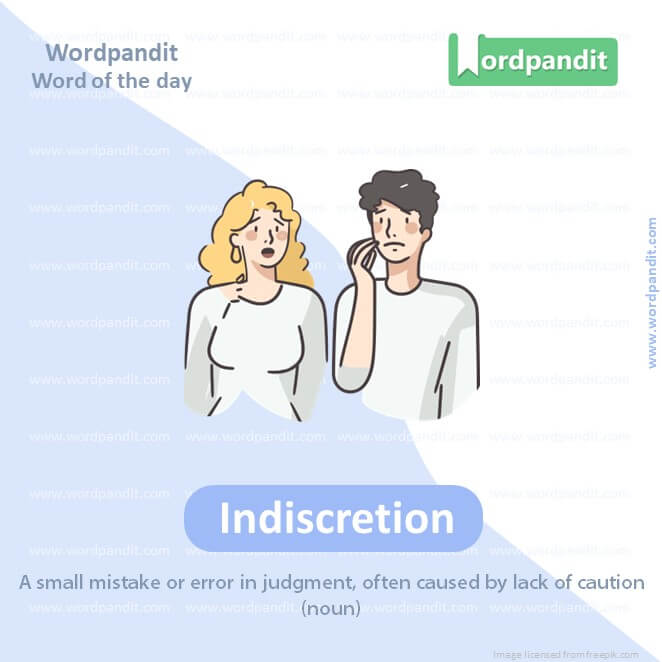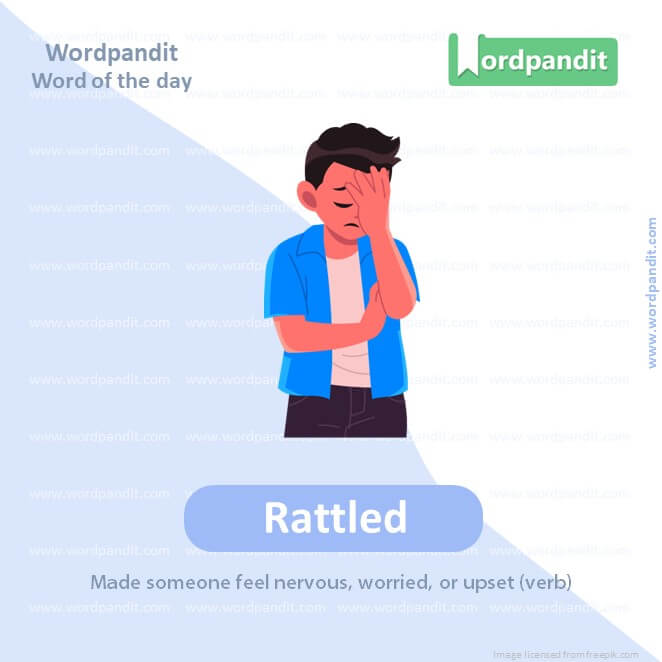Daily Vocabulary Words: List of Daily Used Words in Leading Indian Newspapers
Hi there. Welcome to this special section @ Wordpandit. Our endeavour here is straightforward: highlighting daily vocabulary words that you would come across in leading newspapers in the country. We have included the following newspapers in our selection:
• The Times of India
• The Economic Times
• Hindustan Times
• Mint
• Indian Express
We are putting in extensive work to develop your vocabulary. All you have to do is be regular with this section and check out this post daily. This is your repository of commonly used words; essentially, we are posting a list of daily used words. Hence, this has significant practical application as it teaches you words that are commonly used in leading publications mentioned above.
Visit the website daily to learn words from leading Indian newspapers.
WORD-1: Culpability
CONTEXT: Soldiers will make genuine mistakes from time to time — only a thorough investigation will establish or negate culpability.
SOURCE: Not specified
EXPLANATORY PARAGRAPH: When someone is responsible for doing something wrong or bad, they have “culpability.” It’s like when you accidentally spill milk and then take responsibility for cleaning it up.
MEANING: Responsibility for a fault or wrongdoing (noun).
PRONUNCIATION: kuhl-puh-BIL-uh-tee
SYNONYMS: guilt, blame, responsibility, fault, accountability
USAGE EXAMPLES:
1. The investigation aimed to determine the level of his culpability in the crime.
2. She accepted her culpability for the mistake and apologized.
3. Legal proceedings were initiated to establish the culpability of the accused.
4. The company’s executives denied any culpability in the financial scandal.
WORD-2: Amounting
CONTEXT: An act of indiscretion amounting to a wilful breach of orders laid down for the conduct of operations will always invite the strongest response from the Army.
SOURCE: Indian Express
EXPLANATORY PARAGRAPH: When something adds up or reaches a certain level, it’s “amounting” to that level. It’s like when you keep adding numbers until you reach the total.
MEANING: Reaching or adding up to a particular level or quantity (verb).
PRONUNCIATION: uh-MOUN-ting
SYNONYMS: totaling, reaching, adding up to, equaling, summing up
USAGE EXAMPLES:
1. The costs are amounting to more than we expected.
2. Her efforts were amounting to success.
3. The evidence is amounting to a strong case against the suspect.
4. Their savings are amounting to a significant amount for their retirement.

WORD-3: Indiscretion
CONTEXT: An act of indiscretion amounting to a wilful breach of orders laid down for the conduct of operations will always invite the strongest response from the Army.
SOURCE: Indian Express
EXPLANATORY PARAGRAPH: When someone makes a mistake or does something wrong, especially in a way that’s not careful, it’s called an “indiscretion.” It’s like when you accidentally break a toy by playing too rough.
MEANING: A small mistake or error in judgment, often caused by lack of caution (noun).
PRONUNCIATION: in-di-SKRESH-uhn
SYNONYMS: mistake, error, lapse, misstep, blunder
USAGE EXAMPLES:
1. His indiscretion led to a misunderstanding between them.
2. The politician’s indiscretion was widely criticized by the media.
3. She regretted her momentary indiscretion at the party.
4. The company suffered financial losses due to management’s indiscretions.
WORD-4: Countering
CONTEXT: How we need to view due processes in such cases of alleged misdemeanour while countering terror operations in a challenging environment.
SOURCE: Indian Express
EXPLANATORY PARAGRAPH: When you do something to oppose or respond to something else, it’s called “countering.” It’s like when you play a card game and play a card to match or beat someone else’s card.
MEANING: Acting in opposition to something, often to nullify its effects (verb).
PRONUNCIATION: KOWN-ter-ing
SYNONYMS: opposing, combating, challenging, contradicting, thwarting
USAGE EXAMPLES:
1. The government implemented new policies for countering inflation.
2. They are countering the competitor’s marketing campaign with their own.
3. The defense attorney focused on countering the prosecution’s arguments.
4. The medication is effective in countering the symptoms of the disease.

WORD-5: Traversed
CONTEXT: Three identifiable stages, then, all traversed in the briefest time possible: Primary parsing; understanding; and imagination.
SOURCE: Indian Express
EXPLANATORY PARAGRAPH: When you move across or travel through something, like when you walk across a field or hike through a forest, you’re “traversing” it.
MEANING: To travel or move across or through something (verb).
PRONUNCIATION: truh-VURST
SYNONYMS: cross, navigate, journey through, pass through, travel over
USAGE EXAMPLES:
1. They traversed the desert on foot.
2. The river can be traversed by boat.
3. The hikers traversed the mountain range in three days.
4. The explorers traversed the jungle, mapping their route as they went.
WORD-6: Plagiarised
CONTEXT: Writers are not facing the possibility of ChatGPT producing an extraordinary and original story, but the prospect of it producing an infinity of bad, unoriginal, plagiarised or near-plagiarised stories.
SOURCE: Indian Express
EXPLANATORY PARAGRAPH: When someone copies someone else’s work and pretends it’s their own, that’s called “plagiarism.” It’s like when you copy your friend’s drawing and say you drew it.
MEANING: To use someone else’s work or ideas as one’s own without permission or credit (verb).
PRONUNCIATION: PLEY-juh-raizd
SYNONYMS: copy, steal, borrow, infringe, imitate
USAGE EXAMPLES:
1. The student was caught plagiarizing an essay from the internet.
2. Plagiarized content can result in serious consequences in academic settings.
3. The author accused the journalist of plagiarizing his article.
4. The company’s website was penalized for using plagiarized content.

WORD-7: Rattled
CONTEXT: The organisation sometimes sounds rattled. It has called outright plagiarism a “bug” and has suggested that strict enforcement of copyright laws will be an existential threat to it.
SOURCE: Indian Express
EXPLANATORY PARAGRAPH: When someone is shaken or disturbed by something unexpected or frightening, they are “rattled.” It’s like when a loud noise suddenly surprises you.
MEANING: Made someone feel nervous. worried, or upset (verb)
PRONUNCIATION: RAT-uhld
SYNONYMS: shaken, disturbed, unnerved, startled, alarmed
USAGE EXAMPLES:
1. She was rattled by the sudden thunderstorm.
2. The unexpected news left him rattled for hours.
3. The accident rattled everyone in the neighborhood.
4. His confidence was rattled after the defeat.
WORD-8: Outrageous
CONTEXT: The political angle, it may be outrageous; from the Constitutional angle, the matter is debatable; but my question has a larger dimension.
SOURCE: Indian Express
EXPLANATORY PARAGRAPH: When something is extremely shocking, unfair, or unacceptable, it’s called “outrageous.” It’s like when someone does something really mean or unfair to you.
MEANING: Shockingly bad or unfair, beyond what is acceptable (adjective).
PRONUNCIATION: out-RAY-juhs
SYNONYMS: shocking, appalling, scandalous, disgraceful, unacceptable
USAGE EXAMPLES:
1. The prices at the restaurant were outrageous.
2. His behavior was outrageous, causing anger among his colleagues.
3. The judge denounced the outrageous act of violence.
4. The company’s policies were deemed outrageous by the employees.

WORD-9: Endangered
CONTEXT: He said that Indian democracy and the Indian Constitution have never been more endangered than they are today.
SOURCE: Indian Express
EXPLANATORY PARAGRAPH: When something is at risk of harm or extinction, it’s “endangered.” It’s like when a species of animals is in danger of disappearing forever.
MEANING: At risk of becoming extinct or very rare (adjective)
PRONUNCIATION: en-DAYN-jerd
SYNONYMS: at risk, threatened, vulnerable, jeopardized, imperiled
USAGE EXAMPLES:
1. The endangered species are protected by wildlife conservation efforts.
2. Pollution is putting many species of fish in the river at risk of becoming endangered.
3. The ancient ruins are endangered by ongoing construction projects.
4. The company’s financial mismanagement left it in an endangered position.

WORD-10: Exorbitant
CONTEXT: They are forced to buy water from tankers that charge exorbitant rates because there is yet not the smallest sign that piped water will become available as ‘guaranteed’.
SOURCE: Indian Express
EXPLANATORY PARAGRAPH: When something is extremely expensive or goes far beyond what is reasonable, it’s called “exorbitant.” It’s like when a toy costs so much money that it’s hard to believe.
MEANING: Charging unreasonably high prices (adjective)
PRONUNCIATION: ig-ZOR-buh-tnt
SYNONYMS: excessive, extravagant, overpriced, unreasonable, steep
USAGE EXAMPLES:
1. The hotel charges exorbitant rates during peak tourist seasons.
2. The exorbitant cost of healthcare is a major concern for many families.
3. The company’s CEO was criticized for receiving an exorbitant salary.
4. The government’s spending on the project was deemed exorbitant by taxpayers.
Vocabulary Pronunciation
The dance of language learning comprises two inseparable partners: vocabulary and pronunciation. The rhythm of this dance is best enjoyed when both partners are in sync. Essentially, mastering ‘vocabulary pronunciation’ is key to expressing and understanding a language effectively. However, what is the ideal approach to learn ‘vocabulary pronunciation’?
Firstly, the process of learning ‘vocabulary pronunciation’ isn’t a sprint. Rather, it’s a marathon where consistency is vital. A gradual and steady pace of learning new words and their pronunciation offers enough time to effectively practice and commit them to memory.
Secondly, to master ‘vocabulary pronunciation’, go beyond written text. Dwell in the world of audible language, such as documentaries, podcasts, music, or language-learning apps that provide pronunciation guides. These memorable auditory experiences aid in refining your ‘vocabulary pronunciation’ and offer a glimpse into the authentic sounds of the language.
Another beneficial strategy for learning ‘vocabulary pronunciation’ involves the use of phonetic transcriptions. They offer systematic approaches to understanding the sound system of a language, thereby improving pronunciation.
Most importantly, do not shy away from practicing your ‘vocabulary pronunciation’. Be it in a language exchange meeting, a conversation with a native speaker, or even a self-recording session, active verbalization massively boosts your pronunciation prowess.
Lastly, always remember to train your ears as much as you train your tongue. Listening carefully to native speakers helps you capture the subtleties of ‘vocabulary pronunciation’, contributing to better delivery when you speak.
In conclusion, mastering ‘vocabulary pronunciation’ is not an overnight journey. It’s a process of intentional practice, sustained listening, conscientious reflection and active usage. As you chart this course with diligence and patience, you will witness your ‘vocabulary pronunciation’ skills blossom, leading you to communicate with greater fluency and confidence.











